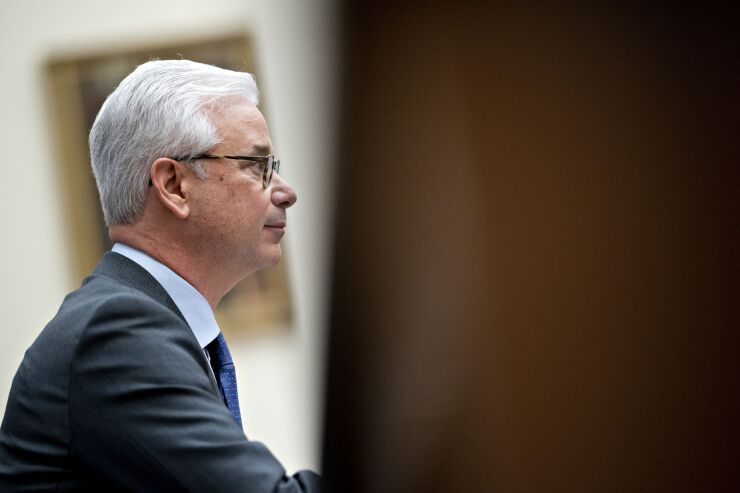WASHINGTON — At his first congressional hearing Tuesday, Democrats greeted new Wells Fargo CEO Charlie Scharf with the same skepticism they showed both of his now-departed predecessors over the bank's many scandals, while Republicans suggested the bank was now on better footing.
House Financial Services Committee Chairwoman Maxine Waters, D-Calif., and other members of the majority criticized the bank's inability to comply with regulatory orders, and it was up to Scharf — who joined the bank in October 2019 from Bank of New York Mellon — to right the ship.
“You must not only rebuild this institution; you must also rebuild America's trust in it, and that begins with your testimony today," Waters said.
But Republicans, who have in the past held Wells' leaders to the fire, warned that congressional criticism of the bank might be less necessary now that the bank's top leaders have been replaced since the phony-accounts scandal came to light in 2016. Two former board members, including former Chair Elizabeth "Betsy" Duke, resigned after a scathing House report, but are

“We’re going to spend all day hearing from Wells Fargo’s brand-new CEO, who has been on the job for all of about six months, who has no connection to the period in question,” said Rep. Patrick McHenry, R-N.C., the panel's ranking member. “And tomorrow, we’re going to drag up two former Board members for the sole purpose of embarrassing them.”
The hearing came after
“Based on the findings of the majority staff report, I agree with the sentiment that Wells Fargo isn't ready to be America's bank again, and this is the challenge before you, Mr. Scharf,” said Waters.
Scharf said he was committed to resolving the bank's regulatory troubles. While he would not commit to a time frame for complying with consent orders, he indicated that they are his number one priority coming in as CEO and highlighted the hiring of a new chief operating officer overseeing compliance.
“I personally am deeply involved in all of our control-related work, including all of the consent orders,” Scharf said. “Our new chief operating officer that we brought in from the outside, who has experience in dealing with issues like this at another bank that was going through a series of issues, is on board now and those responsibilities sit directly under him. He is probably spending 90% of his time on these issues.”
Scharf also told the panel that the bank no longer uses sales goals as a metric in determining employee compensation, which contributed to the opening of more than 3.5 million phony accounts.
“We’ve changed all of the practices that led to the bad sales behavior,” Scharf said. “Today, our front line bankers are paid based upon a series of criteria, none of which are sales goals. It’s things such as customer experience, it is balances in the overall account, and things like that.”
Yet the spotlight on Scharf was diverted to a degree by the partisan back-and-forth between members of the committee, who at times seemed at odds over whether the hearing should even take place.
McHenry agreed that the bank’s management at the time of the scandals was flawed and former board members failed consumers, but he disputed Democrats' claim that Wells' problems reflect a need to break up the largest U.S. banks.
“Wells Fargo isn’t too big to manage — it was grossly mismanaged,” he said. “The evidence shows the source of the company’s problem was its federated structure, and a leadership team that couldn’t fix it. Those are issues that are unique to Wells Fargo. Wells Fargo was uniquely mismanaged. However, the evidence doesn’t tell us much about Wells Fargo’s large bank peers. “
Since the 2016 scandal, congressional hearings with Wells' former CEOs, John Stumpf and Tim Sloan, were followed by both leaders being ousted.
Democrats took issue with McHenry’s suggestion that the latest round of Wells hearings were not necessary
Rep. Brad Sherman, D-Calif., noted that without the Democrats’ staff report, the board members involved with the bank during the scandal would not have resigned.
“The ranking member attacks the work of this committee, while at the same time saying it’s great that these two directors were forced to resign because there were highly embarrassing disclosures, so the system worked,” Sherman said. “Had we continued the hear-no-evil, see-no-evil approach that this committee had the prior Congress, these embarrassing disclosures would never have come out and these embarrassing board members would still be on your board.”
But in addressing Scharf, Republicans struck a mostly positive tone and appeared willing to give the new CEO the benefit of the doubt.
"I agree with you when you say, 'I believe that our country and communities would benefit from a strong Wells Fargo.' I wish you all the best as you make these very important changes to correct these failures in the past," said Rep. Andy Barr, R-Ky.
When asked by Barr whether he thinks Wells Fargo is too big to manage, Scharf said: “No, I don’t.”
Under tough questioning from, Rep. David Scott, D-Ga., about the time it has taken for Wells to fulfill the consent orders, Scharf stressed that he cannot speak for what the bank had been doing under prior leadership.
“I joined the company four months ago,” Scharf said. “I’m not in a position to explain what was done right and what was done wrong, because I wasn’t there. But, I can tell you about the changes that we're making.”





